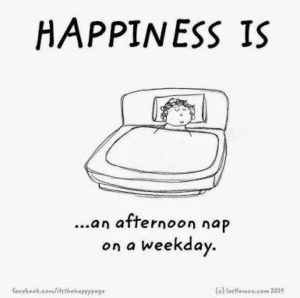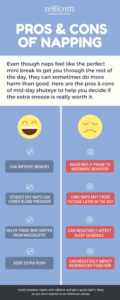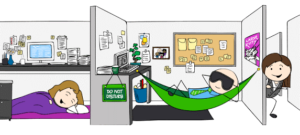Pros and cons of An afternoon nap
Contents

A nap is a short period of sleep, typically taken during daytime hours as an adjunct to the usual nocturnal sleep period. Naps are most often taken as a response to drowsiness during waking hours.

Napping can be a healthy, regenerative activity we do for ourselves. Getting some sleep, even a short afternoon nap, may seem like a good thing for people with sleep disorders. But for those with insomnia and an already decreased desire to sleep at night, midday shut-eye can actually be counterproductive. So before you curl up on the couch this afternoon, consider whether your quick fix might backfire when you lie down in bed tonight.
Benefits of a nap :
A well planned nap can:
- Improve alertness
- Bring on relaxation
- Reduce fatigue
- Enhance mood
- Create effective problem solvers
- Manage stress
- Eliminate drowsy driving
- Improve memory
- Increase patience
- Lower blood pressure
- Raise morale/workplace safety
- Improve creativity
- Prevent heart disease

Why is a nap not beneficial?
Napping does not cause insomnia, but a nap for an insomnia person can do more harm than good. For those who have difficulty falling asleep at night, napping during the day will make falling asleep at night even more difficult.
What’s the best way to take a nap?
To get the most out of a nap, follow these tips:

1. Keep naps short.
2. Aim to nap for only 10 to 30 minutes.
3. The longer you nap, the more likely you are to feel groggy afterward.
4. Take naps in the afternoon. The best time for a nap is usually mid afternoon, around 2 or 3 p.m. This is the time of day when you might experience post-lunch sleepiness or a lower level of alertness. In addition, naps taken during this time are less likely to interfere with nighttime sleep. Keep in mind, however, that individual factors such as your need for sleep and your sleeping schedule also can play a role in determining the best time of day to nap.
5. Create a restful environment.
6. Nap in a quiet, dark place with a comfortable room temperature and few distractions.
7. After napping, be sure to give yourself time to wake up before resuming activities particularly those that require a quick or sharp response.
When is it best to take naps?
The best hour for most people to nap is between 2:00pm and 3:00pm. That’s because you’ve already eaten lunch and your blood sugar and energy levels will naturally start to dip. In fact, your body clock is often programmed to make you feel a little sleepy in the middle of the afternoon. If you try to nap earlier, your body might not actually be ready for more sleep. One of the best ways to pick your optimal nap time is to base it on the hour that you wake up. For instance, if you wake up at 7:00am, then your ideal nap time is 2:00pm. A 6:00am wake-up means that you should nap around 1:30pm and a 7:30am wake-up call should lead to a 2:30pm nap.
Does napping change your metabolism?
When we sleep, everything from our heart rate and breathing to our digestion and metabolism slows down so we get some rest. Taking an afternoon nap isn’t going to have a significant impact on your metabolism either. Yes, your body slows down your heart rate, breathing, digestion, everything slows down when you take a nap, but your body’s metabolism on the whole isn’t so finicky that small things like an hour’s nap in the afternoon is going to change it appreciably. Even if you’re still worried about some metabolic impact that a nap might have, you should consider how relaxing and energizing the effects of an afternoon nap can be from a stress-response perspective. Whether we’re stressed out because of the events of the day or we’re feeling burnt out, stressful jobs do more than just harm us mentally and emotionally they translate into weight gain and unhealthy habits. By contrast, taking a nap gives you an opportunity to recharge, relax, and shut down that stress response. Since stress and its mental implications tend to lead people to eat, skip exercise, sacrifice sleep at night, and indulge in other unhealthy habits, a nap may be more key to helping you stay healthy than skipping one.
Does sleeping make you fat?
- Sleeping doesn’t make you fat.
In fact sleep deprivation or working late nights is one of the reasons to gain weight. - 30-40 mins of nap in the afternoon is beneficial.
This helps in negating the productivity of work in the latter part of the day. - Do not sleep within 1-2 hours of lunch
To prevent slowing down the digestion process and increasing the chances of acid reflux due to your horizontal posture.
Thus keep it short and space it appropriately post lunch.
Need a perfect nap? Follow these tips :
- DON’T USE YOUR ALARM CLOCK UNLESS YOU HAVE TO.If you take the time to develop healthy napping habits, your body will naturally wake up in 20 to 60 minutes. Plus, jolting awake at the sound of your alarm gives you an immediate and unnatural injection of stressful adrenaline and cortisol.
- TIME YOUR NAPS. Try to nap seven to eight hours after you wake up, when, in theory, you would be the least alert.
- DON’T DRINK COFFEE BEFORE YOUR NAP. Even having tiny amounts of caffeine in your system messes with your sleep quality. If you’re going to take the time to nap, you might as well get the most out of it, which means avoiding caffeine!
- AVOID STRESS BEFORE NAPPING. Try to schedule low-stress activities directly before your nap. That way, you’ll be able to sleep more soundly.
- DON’T EXERCISE IMMEDIATELY BEFORE NAPPING. Although naps help with exercise recovery, Greenfield advises finishes your workout at least 45 minutes before the start of your nap to get the best results.
- EAT BEFORE YOUR NAP. If you’re hungry when you go down for a nap, odds are you are not going to sleep very well, so try napping right after lunch.
- STICK TO A SCHEDULE. If possible, nap at the same time every day. That way, your body will become accustomed to a routine.
- DON’T USE ALCOHOL OR SEDATIVES TO INITIATE A NAP. If you do, you’ll just wake feeling sluggish and fatigued rather than rested and prepared to take on the rest of the day.
Summary :
Short, early afternoon naps help in returning vitality and alertness. Careful timing, duration and location of the nap will help ensure optimum results. Naps benefit most people, and shift workers, commercial truck drivers and narcoleptics especially benefit from naps. If a nap is necessary on a daily basis to just get through the day, an underlying sleep disorder or other medical condition may be affecting your life adversely. Discussing your situation with your physician or a sleep specialist may point you in the right direction to resolve your sleep problem.
-Shreesha Balan
For more health-related articles, click here



0 Comments